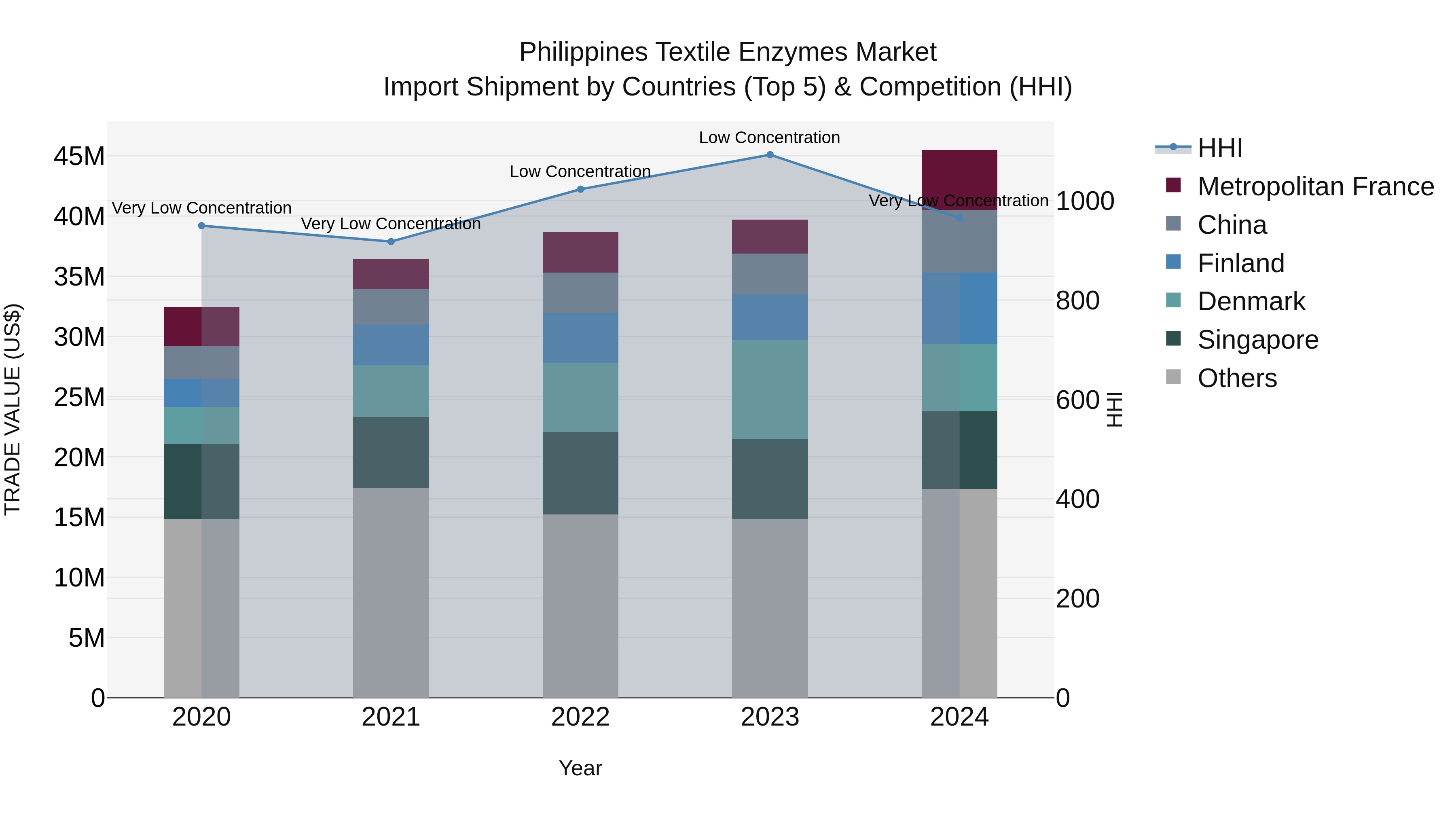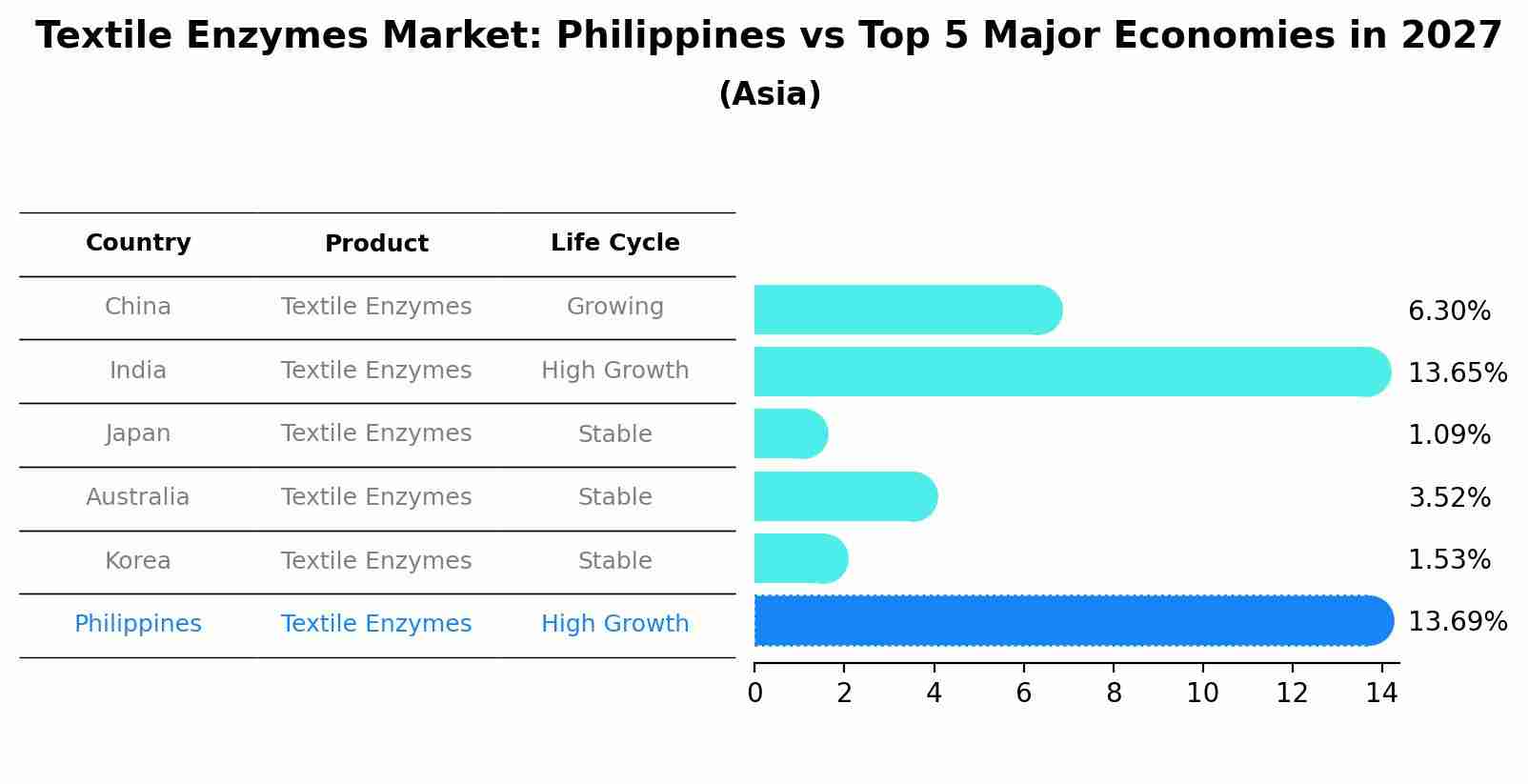Philippines Textile Enzymes Market (2025-2031) Outlook | Size, Share, Industry, Forecast, Companies, Trends, Value, Growth, Analysis & Revenue
| Product Code: ETC094068 | Publication Date: Jun 2021 | Updated Date: Nov 2025 | Product Type: Report | |
| Publisher: 6Wresearch | Author: Ravi Bhandari | No. of Pages: 70 | No. of Figures: 35 | No. of Tables: 5 |
Philippines Textile Enzymes Market Top 5 Importing Countries and Market Competition (HHI) Analysis
The Philippines textile enzymes import market saw significant growth in 2024, with top exporting countries including Singapore, Finland, Denmark, China, and Metropolitan France. The market concentration, as measured by the HHI, decreased from low to very low in 2024, indicating a more competitive landscape. The impressive compound annual growth rate (CAGR) of 8.8% from 2020 to 2024, coupled with a notable growth rate of 14.57% in 2024, highlights the increasing demand for textile enzymes in the Philippines. This suggests a promising outlook for the industry in the coming years.

Textile Enzymes Market: Philippines vs Top 5 Major Economies in 2027 (Asia)
The Textile Enzymes market in Philippines is projected to grow at a high growth rate of 13.69% by 2027, within the Asia region led by China, along with other countries like India, Japan, Australia and South Korea, collectively shaping a dynamic and evolving market environment driven by innovation and increasing adoption of emerging technologies.

Philippines Textile Enzymes Market Synopsis
The Philippines textile enzymes market is estimated to grow at a CAGR of 6.3% during the forecast period. The growing demand for enzyme-based detergents and bio-scouring agents in the global market will drive the growth of textile enzymes in the country. In addition, increasing investments from international players into R&D activities regarding biotechnological innovations and production upgrades of this type of enzyme are expected to propel its growth further over the forecast period.
Drivers of the market
The Philippines Textile Enzymes market is driven by several key factors. Increasing environmental concerns and a growing emphasis on sustainability in the textile industry have prompted manufacturers to seek eco-friendly solutions. Textile enzymes offer benefits such as reduced water consumption, energy savings, and minimized chemical usage in processes like desizing, scouring, and bio-polishing. Additionally, the demand for high-quality and innovative textile products has fueled the adoption of enzyme-based treatments that enhance fabric properties and aesthetics.
Challenges of the market
The Philippines Textile Enzymes market faces certain challenges that impact its growth and development. One significant challenge is the need for consistent quality and performance of textile enzymes across various production processes. Ensuring that enzymes function effectively under different conditions, such as varying pH levels and temperatures, presents a technical hurdle for manufacturers. Additionally, raising awareness among textile manufacturers about the benefits of using enzymes for sustainable and eco-friendly processing can be a challenge. Overcoming these challenges requires continuous research and development efforts to enhance enzyme performance and educate the industry about their advantages.
Covid-19 Impact of the market
The Philippines Textile Enzymes market, like many industries, experienced the impact of the COVID-19 pandemic. During the pandemic, disruptions in supply chains, reduced consumer spending, and lockdown measures affected the demand for textiles and subsequently the demand for textile enzymes. Key players in this market, including EnzymeTech Solutions and TextileCare Innovations, had to navigate through challenges such as reduced production and delayed projects. However, as restrictions eased, there was a gradual recovery in the textile industry, and the demand for sustainable and eco-friendly textile processing solutions, like enzymes, continued to grow.
Key Players of the market
In the Philippines Textile Enzymes market, prominent players from the textile and chemical industries are instrumental in producing and supplying a wide range of textile enzymes. Companies such as EnzymeTech Solutions, TextileCare Innovations, and FabricEnzyme Industries contribute significantly to enhancing fabric finishing, dyeing, and processing. These key players leverage enzymatic technology to provide sustainable and innovative solutions that improve the quality, aesthetics, and eco-friendliness of textiles, catering to the evolving demands of the textile industry.
Key Highlights of the Report:
- Philippines Textile Enzymes Market Outlook
- Market Size of Philippines Textile Enzymes Market, 2024
- Forecast of Philippines Textile Enzymes Market, 2031
- Historical Data and Forecast of Philippines Textile Enzymes Revenues & Volume for the Period 2021-2031
- Philippines Textile Enzymes Market Trend Evolution
- Philippines Textile Enzymes Market Drivers and Challenges
- Philippines Textile Enzymes Price Trends
- Philippines Textile Enzymes Porter's Five Forces
- Philippines Textile Enzymes Industry Life Cycle
- Historical Data and Forecast of Philippines Textile Enzymes Market Revenues & Volume By Type for the Period 2021-2031
- Historical Data and Forecast of Philippines Textile Enzymes Market Revenues & Volume By Cellulase for the Period 2021-2031
- Historical Data and Forecast of Philippines Textile Enzymes Market Revenues & Volume By Amylase for the Period 2021-2031
- Historical Data and Forecast of Philippines Textile Enzymes Market Revenues & Volume By Catalase for the Period 2021-2031
- Historical Data and Forecast of Philippines Textile Enzymes Market Revenues & Volume By Pectinase for the Period 2021-2031
- Historical Data and Forecast of Philippines Textile Enzymes Market Revenues & Volume By Laccase for the Period 2021-2031
- Historical Data and Forecast of Philippines Textile Enzymes Market Revenues & Volume By Others for the Period 2021-2031
- Historical Data and Forecast of Philippines Textile Enzymes Market Revenues & Volume By Application for the Period 2021-2031
- Historical Data and Forecast of Philippines Textile Enzymes Market Revenues & Volume By Bio-polishing for the Period 2021-2031
- Historical Data and Forecast of Philippines Textile Enzymes Market Revenues & Volume By Desizing for the Period 2021-2031
- Historical Data and Forecast of Philippines Textile Enzymes Market Revenues & Volume By Enzymatic Bleaching for the Period 2021-2031
- Historical Data and Forecast of Philippines Textile Enzymes Market Revenues & Volume By Bioscouring for the Period 2021-2031
- Historical Data and Forecast of Philippines Textile Enzymes Market Revenues & Volume By Others for the Period 2021-2031
- Philippines Textile Enzymes Import Export Trade Statistics
- Market Opportunity Assessment By Type
- Market Opportunity Assessment By Application
- Philippines Textile Enzymes Top Companies Market Share
- Philippines Textile Enzymes Competitive Benchmarking By Technical and Operational Parameters
- Philippines Textile Enzymes Company Profiles
- Philippines Textile Enzymes Key Strategic Recommendations
Frequently Asked Questions About the Market Study (FAQs):
- Single User License$ 1,995
- Department License$ 2,400
- Site License$ 3,120
- Global License$ 3,795
Search
Thought Leadership and Analyst Meet
Our Clients
Related Reports
- Canada Oil and Gas Market (2026-2032) | Share, Segmentation, Value, Industry, Trends, Forecast, Analysis, Size & Revenue, Growth, Competitive Landscape, Outlook, Companies
- Germany Breakfast Food Market (2026-2032) | Industry, Share, Growth, Size, Companies, Value, Analysis, Revenue, Trends, Forecast & Outlook
- Australia Briquette Market (2025-2031) | Growth, Size, Revenue, Forecast, Analysis, Trends, Value, Share, Industry & Companies
- Vietnam System Integrator Market (2025-2031) | Size, Companies, Analysis, Industry, Value, Forecast, Growth, Trends, Revenue & Share
- ASEAN and Thailand Brain Health Supplements Market (2025-2031) | Strategy, Consumer Insights, Analysis, Investment Trends, Opportunities, Growth, Size, Share, Industry, Revenue, Segments, Value, Segmentation, Supply, Forecast, Restraints, Outlook, Competition, Drivers, Trends, Demand, Pricing Analysis, Competitive, Strategic Insights, Companies, Challenges
- ASEAN Bearings Market (2025-2031) | Strategy, Consumer Insights, Analysis, Investment Trends, Opportunities, Growth, Size, Share, Industry, Revenue, Segments, Value, Segmentation, Supply, Forecast, Restraints, Outlook, Competition, Drivers, Trends, Demand, Pricing Analysis, Competitive, Strategic Insights, Companies, Challenges
- Europe Flooring Market (2025-2031) | Outlook, Share, Industry, Trends, Forecast, Companies, Revenue, Size, Analysis, Growth & Value
- Saudi Arabia Manlift Market (2025-2031) | Outlook, Size, Growth, Trends, Companies, Industry, Revenue, Value, Share, Forecast & Analysis
- Uganda Excavator, Crane, and Wheel Loaders Market (2025-2031) | Strategy, Consumer Insights, Analysis, Investment Trends, Opportunities, Growth, Size, Share, Industry, Revenue, Segments, Value, Segmentation, Supply, Forecast, Restraints, Outlook, Competition, Drivers, Trends, Demand, Pricing Analysis, Competitive, Strategic Insights, Companies, Challenges
- Rwanda Excavator, Crane, and Wheel Loaders Market (2025-2031) | Strategy, Consumer Insights, Analysis, Investment Trends, Opportunities, Growth, Size, Share, Industry, Revenue, Segments, Value, Segmentation, Supply, Forecast, Restraints, Outlook, Competition, Drivers, Trends, Demand, Pricing Analysis, Competitive, Strategic Insights, Companies, Challenges
Industry Events and Analyst Meet
Whitepaper
- Middle East & Africa Commercial Security Market Click here to view more.
- Middle East & Africa Fire Safety Systems & Equipment Market Click here to view more.
- GCC Drone Market Click here to view more.
- Middle East Lighting Fixture Market Click here to view more.
- GCC Physical & Perimeter Security Market Click here to view more.
6WResearch In News
- Doha a strategic location for EV manufacturing hub: IPA Qatar
- Demand for luxury TVs surging in the GCC, says Samsung
- Empowering Growth: The Thriving Journey of Bangladesh’s Cable Industry
- Demand for luxury TVs surging in the GCC, says Samsung
- Video call with a traditional healer? Once unthinkable, it’s now common in South Africa
- Intelligent Buildings To Smooth GCC’s Path To Net Zero


















